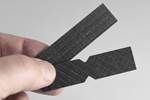Compcut features ACS, PCR composite cutting technologies
Advanced plate saw and precision router provide precise, fast and efficient cutting of composite test specimens.
Precision composite router (left) and composite saw (right). Photo Credit: Compcut
, a specialist division designing and manufacturing state-of-the-art composite cutting and machining solutions, powered Sharp & Tappin (Holsworthy, U.K.), presents two flagship machines from its next-generation composites cutting fleet, the advanced composite saw (ACS) and precision composite router (PCR), for precise, fast and efficient cutting of composite test specimens.
The PCR 300 is well-suited for cutting complex geometries from a range of composite materials, including carbon fiber-reinforced plastic (CFRP), thermoplastics and aramid fibers. Featuring a “hybrid” machining solution, it combines routing and CNC milling, capable of cutting high-precision “dog bone” and “open hole” compression test samples. It is available as a “complete solution package” with a comprehensive range of cutting tools and a suite of machining programs.
Compcut’s ACS 300 demonstrates highly consistent and accurate parallelism and perpendicularity (down to 0.03 mm) when cutting test specimens (read “Compcut ACS 300 machine provides safety, high performance for U.K. students”). The composite plate saw, with a clear panel size of 300 × 300 mm, is ideal for smaller laminate sizes and test specimens. The finish of cut samples from the ACS 300 requires no post-processing.
Related Content
-
Cold cutting equipment designed for carbon fiber
CAMX 2024: Sheffield, a producer of highly accurate cutting machines, highlights its C-503 model machine made to cut carbon fiber, fiberglass and even natural fibers.
-
Composite cutting systems are dedicated to material optimization
CAMX 2024: FKgroup showcases its solutions for cutting composite materials, focusing on sustainability and efficiency.
-
SGL Carbon offers customizable, prefabricated composite textile stacks
SGL aims to eliminate the work involved from material roll to stack for customers entirely, cost-effectively pre-cutting and assembling Sigratex stack packages to application specifications, saving time, cost and waste.



